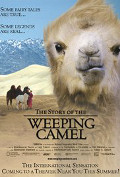
Directed by
Byambasuren Davaa & Luigi Falorni
90 minutes
Rated PG
Reviewed by
Bernard Hemingway


The Story Of The Weeping Camel
In the Gobi Desert in Southern Mongolia, a small population of camel herders prepares for their female camels to give birth to young colts. The last colt of the season is a hard delivery for a novice mother, who rejects her troublesome offspring, leaving her owner's family the task of reconciling her to her new role.
If you've ever seen the classic 1934 Robert Flaherty documentary Man of Aran, about a family eking out a rudimentary existence on a bare and tiny island off the coast of Ireland you will readily find comparisons with this film. Flaherty came under criticism for having staged some of his scenes but in this context that only brings the two films closer together.
The Story of the Weeping Camel, which makes no pretence to be a documentary, shares with Flaherty's film the subject of survival in a harsh environment. It has gentler feel and the main elements are wind and sand rather than wind and sea but there is a similar observational attention (and a very similar use of spare dialogue and ambient sound) to the daily round of activities and the rhythms of its subjects' lives.
An impressive achievement by two Munich film school students, the film is beautifully photographed and skilfully constructed, deftly using the frame of its simple story to show us another way of living, one which one cannot help but feel is not likely to last much longer in the face of the attractions of television and video games on the young. Of course as Westerners we are very distant from the realities of its world and how true to the herders' lives or otherwise it is cannot be said although as co-director Davva is a native of Mongolia one assumes there is not too much Flaherty-like manipulation of the truth.
Want something different?





